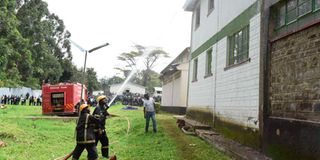School fires a reflection of rot in society

Firemen putting out fire on a burning dormitory at Kakamega High School on November 6, 2021.The school has been closed indefinitely following the incident.
What you need to know:
- Our societies cannot be hotbeds of corruption and mediocrity and expect students to be any different.
- We cannot be the society that resorts to violence during campaigns and elections and expect our children to do better than us.
The recent spate of school fires, violence and indefinite closure of secondary schools across the country should worry all of us.
It should bother us when secondary school students – children, really – become unruly and violent, burning their dormitories and destroying property as a way of venting their frustration with the school authorities.
This has been a tough season for children. With barely enough time for holidays, a jam-packed school curriculum, financially overstretched parents and overwhelmed teachers, things are bound to get ugly. We rarely consider the impact of Covid-19 on children – including high school students. They also experienced the impact of declining livelihoods in their families and, sadder still, some were orphaned by Covid-19 or watched their loved ones battle the disease.
That said, this does not in any way excuse any bad behaviour. As child psychology experts share their opinion on how we must deal with unruly secondary school students, we must as society also ask ourselves the big question: “Why are children behaving this way?” We must look inwardly and reflect on why the first course of action for these frustrated students is violence as opposed to options such as dialogue.
I have argued here many times before that in the formative secondary-school years, teenagers will most likely model their behaviour and values on what they see rather than what they are asked or required to do. Our societies cannot be hotbeds of corruption and mediocrity and expect students to be any different.
Violence during campaigns
At a global and societal level, we cannot be the society that resorts to violence during campaigns and elections and expect our children to do better than us. We must, therefore, interrogate our role in the students’ behaviour and ask ourselves: if the burning of schools and wanton destruction of property is not a reflection of us, then what is?
Let us not forget that these are children raised by their parents and guardians who, when all is said and done, are responsible for the behaviour of their children, at least those below 18 years. Could this be a sign of parenting, or lack thereof?
Lastly, and most important, it is time to rethink the state of our boarding schools in Kenya. Some of us who attended boarding school swore to never take our children through the same trauma because the majority of boarding schools in Kenya are little prisons or concentration camps; filthy, poorly designed toxic environments that no human being deserves to live in.
It does not take a lot to make our boarding schools habitable environments for our children. Simple things like airy and spacious dormitories, good mattresses, decent food, a clean environment and a bit of kindness would go a long way. For some of these kids, boarding schools are their safe havens, let’s make them better.
Allow me to stop here. I am beginning to get emotional just by recalling those horrible high school years!
The writer is the Director, Innovation Centre, at Aga Khan University; [email protected]





